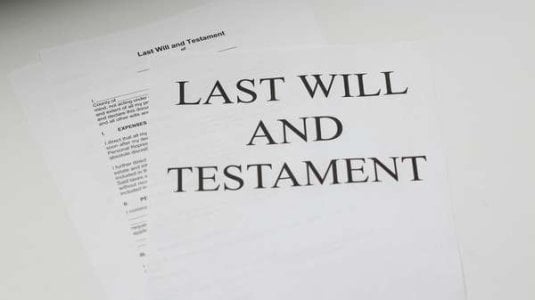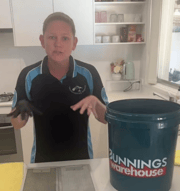
Australia is on the brink of the greatest wealth transfer in its history. Over the next two decades, Australians will inherit an estimated $3.5 trillion—a staggering sum that represents decades of hard work, property investments, and careful savings.
Yet there's a problem lurking in family filing cabinets across the country: the very documents meant to ensure this wealth reaches the right hands might be completely useless.
While 93 per cent of people over 70 years of age have a will, recent research reveals a troubling gap. Nearly one-third (31 per cent) of Australians over 50 are yet to create a will, and almost half (49 per cent) haven't updated theirs in more than five years.
In Queensland alone, a survey found that 52 per cent made their will more than 10 years ago, and 32 per cent had never updated it.
The consequences aren't just bureaucratic headaches—they're family-breaking, wealth-destroying disasters waiting to happen. As Samay Zhouand, the Public Trustee of Queensland, warns: 'Some life changes can revoke your existing will completely, meaning your estate will be distributed according to the rules of intestacy and not your wishes.'
In this article
The Hidden Cost of Doing Nothing
Before diving into the nine critical life changes that can invalidate your will, it's worth understanding what's at stake financially. When estates aren't properly planned, the costs multiply quickly. According to the NSW Trustee & Guardian, 30 per cent of estates in NSW are intestate—meaning they have no valid will at all.
Consider this: a simple will from a lawyer costs between about $600 for a simple will and $3,000 for a very sophisticated, complex will. Yet when an estate becomes complicated due to an outdated or invalid will, legal costs can spiral into tens of thousands of dollars, not to mention the emotional toll on your loved ones.
The good news? You don't have to choose between expensive lawyers and risky do-it-yourself options. Modern alternatives have emerged that bridge this gap, offering professional oversight at reasonable costs.
'Some life changes can revoke your existing will completely, meaning your estate will be distributed according to the rules of intestacy and not your wishes.'
Nine Life Changes That Could Void Your Will
The Queensland Public Trustee has identified nine significant life events that can impact your will. Here's what every Australian senior needs to know, enhanced with the latest insights from legal experts nationwide.
1. Getting Divorced: The Automatic Eraser
Divorce doesn't just end your marriage—it automatically revokes any gifts willed to your former spouse and cancels their appointment as executor, unless your will explicitly states otherwise. This happens by law, not by choice, which means you need a new will to name alternative beneficiaries and a new executor.
This automatic revocation exists to prevent unintended outcomes, but it can create gaps in your estate plan. If you don't update your will after divorce, those gifts might simply disappear from your estate distribution, potentially leaving other beneficiaries with more than you intended.
2. Separating: The Dangerous Gap
Unlike divorce, separation has no automatic impact on your will. This creates a particularly dangerous situation where an estranged partner could still benefit from your estate, regardless of how acrimonious your separation might be.
Even if you haven't spoken to your separated spouse in years, they remain legally entitled to inherit under your existing will. A new will is essential to ensure your estranged partner doesn't receive assets you'd prefer to go elsewhere.
Modern Relationship Complexities
Today's family structures are more complex than ever. With blended families, de facto relationships, and changing social norms, the traditional assumptions built into older wills often no longer reflect reality. Regular reviews ensure your will keeps pace with your actual relationships and intentions.
3. Getting Married: The Complete Reset
Marriage or civil partnership automatically revokes your entire will, unless the will was made specifically 'in contemplation' of that marriage. This complete revocation catches many couples by surprise, especially those who marry later in life after carefully crafting their estate plans.
If you die without making a new will after marriage, you'll be considered to have died intestate. The intestacy rules will then dictate how your estate is distributed, which might not align with your wishes or your new spouse's needs, especially if you have children from previous relationships.
4. Moving in Together: The De Facto Dilemma
A de facto partner of two or more years is legally considered a spouse for inheritance purposes, but proving this relationship status isn't always straightforward. Bank accounts or property that you own with another person automatically go to the other person if you die, unless you structure the ownership as tenants-in-common.
The courts consider multiple factors when determining de facto status, including cohabitation, financial interdependence, and the nature of the relationship. Updating your will to specifically include or exclude a de facto partner provides certainty and avoids potential disputes.
5. Acquiring New Assets: The Wealth Gap Problem
As your financial situation changes, your will needs to evolve accordingly. A will that doesn't reflect your current assets can create confusion for executors and disputes among beneficiaries. This is particularly relevant given the significant property price increases many Australian seniors have experienced.
If your entire estate isn't properly distributed under your will's terms, you might be considered 'partially intestate.' This means some assets could be distributed according to intestacy rules rather than your wishes—a particular concern given the massive wealth transfer currently underway.
6. Blended Family Challenges: The Step-Relationship Maze
Modern Australian families are increasingly complex, with step-children, half-siblings, and multiple marriages creating intricate relationship webs. The law generally assumes you have a moral obligation to ensure your spouse and children are reasonably provided for, but this can create complications in blended families.
Stepchildren who believe they aren't adequately provided for can make family provision applications—legal challenges that can be expensive for the estate to defend. The birth, adoption, or creation of blended family relationships provides an ideal opportunity to review and update your will proactively.
Did you know?
Did you know?
A study by the University of Queensland found that nearly 50 per cent of do-it-yourself wills may be invalid or ineffective, often due to family complexity that wasn't properly addressed in template documents. Professional guidance becomes increasingly valuable as family structures become more complicated.
7. When Your Executor Dies: The Administrative Nightmare
Executors must be explicitly named in your will, and they carry significant legal and financial responsibilities. If your sole executor dies or becomes unable to fulfil their role, your estate may require a court application to appoint an administrator—a process that can delay distribution by several months and add substantial costs.
One of the most overlooked estate planning mistakes in Australia is appointing someone without the financial skills or availability to handle estate duties effectively. Consider appointing backup executors and ensure your primary choice understands their responsibilities.
8. Beneficiary Death: The Domino Effect
When a beneficiary dies before you, it can trigger confusion and disputes if your will doesn't have clear provisions for redistributing their intended gifts. If all your beneficiaries predecease you and no other eligible beneficiaries exist, your estate might ultimately be transferred to your state government.
This situation highlights the importance of including contingent beneficiaries and clear instructions about what happens if primary beneficiaries are no longer alive when your will takes effect.
9. Interstate Moves: The Legal Jurisdiction Jumble
Australia's federal system means each state and territory has slightly different inheritance and estate laws. Moving interstate can affect your will's effectiveness because statutory amounts, intestacy rules, and legal requirements vary between jurisdictions.
In Queensland, all decisions (legal, financial, personal and medical) are made under an Enduring Power of Attorney. In South Australia, legal and financial decisions are made under an EPOA. However, personal and medical decisions are made under an Advance Care Directive. These variations extend to will requirements and probate processes.
What does this mean for you?
- If you've moved interstate in recent years, your will and associated documents might not align with your new state's requirements
- This could complicate the administration of your estate and potentially invalidate some of your wishes
- A review with a local legal professional can identify any issues before they become problems
The Modern Solution: Technology Meets Tradition
The traditional model of expensive lawyers and lengthy appointments is being revolutionised by technology. Online will services now offer professionally reviewed documents at a fraction of traditional costs, with some services providing legally reviewed wills for as little as $160, taking less than 20 minutes to complete.
These platforms typically involve completing a questionnaire prepared by Australian lawyers, followed by professional review to ensure accuracy and legal compliance. While not suitable for extremely complex estates, they offer an excellent middle ground for many Australian seniors.
Cost Comparison: Traditional vs Modern Will-Making
Traditional lawyer: $600-$3,000+
Public Trustee: $200-$800
Online services: $160-$400
DIY kits: $30-$100 (but 50 per cent may be invalid)
Remember: The cheapest option isn't always the most cost-effective if it results in an invalid or contested will.
Digital Assets: The New Frontier
Modern estate planning must consider digital assets that didn't exist when many seniors first made their wills. With the rise of cryptocurrencies and online accounts, it's vital to include instructions for these in your will. The Australian Taxation Office provides guidelines on how these assets are treated for tax purposes.
Consider your digital footprint: online banking, cryptocurrency wallets, digital photos stored in the cloud, social media accounts, and subscription services all need consideration in your estate plan.
State-by-State Differences: Know Your Local Laws
While wills share common principles across Australia, the supporting documents vary significantly by state. Understanding your local requirements ensures comprehensive protection:
- Queensland: Single Enduring Power of Attorney covers all decisions
- New South Wales: Enduring Power of Attorney for financial decisions, separate Enduring Guardianship for personal/medical decisions
- Victoria: Similar to NSW with separate documents
- South Australia: EPOA for financial, Advance Care Directive for medical
- Western Australia: EPOA for financial, Enduring Power of Guardianship for personal/medical
These differences matter because incomplete documentation can leave gaps in your protection, particularly if you become unable to make decisions for yourself.
Essential Action Steps for Australian Seniors
- Review your will every 3-5 years or after major life changes
- Ensure your executor is still willing and capable of serving
- Update beneficiary details and contact information
- Consider digital assets and modern estate planning needs
- Verify your will complies with your current state's requirements
- Keep original documents secure but accessible
- Discuss your wishes with family members to prevent surprises
The Real Cost of Delay
Estate planning procrastination carries hidden costs that extend far beyond legal fees. Family relationships fracture over disputed inheritances. Assets get frozen in legal limbo. Well-meaning relatives face unexpected tax burdens.
Too often, poorly drafted wills bring out the worst in families, with results that were never intended. The emotional cost of family disputes often exceeds any financial savings from avoiding professional advice.
Barry Du Bois, former presenter of The Living Room, learned this lesson when his mother's sudden death served as a wake-up call. Following his own cancer diagnosis, he emphasised the importance of regular will updates: 'I don't want there to be any confusion if something happens.'
Example Scenario
- The Miller Family Story: When John Miller died unexpectedly at 68, his family discovered his will was 15 years old and named his deceased brother as executor. His second wife wasn't mentioned, his stepchildren had no provision, and a property he'd sold years earlier was still listed. What should have been a straightforward inheritance became an 18-month legal battle costing the estate over $45,000 in legal fees—money that could have supported his widow's retirement.
Taking Action: Your Next Steps
Don't let your will become another Australian estate planning disaster. The process doesn't have to be overwhelming or expensive, but it does require action.
Start by gathering basic information: a list of your assets, beneficiaries' full names and addresses, and potential executors' details. Whether you choose a traditional lawyer, an online service, or work with a Public Trustee, having this information ready streamlines the process.
Consider your family's complexity. Simple situations might suit online platforms or Public Trustee services, while blended families, overseas assets, or business interests typically benefit from specialised legal advice.
Remember that estate planning is not a one-time task. Life changes, laws evolve, and family circumstances shift. Regular reviews ensure your will remains an accurate reflection of your wishes rather than a historical document that no longer serves your needs.
Your Legacy Deserves Better
Australia's $3.5 trillion wealth transfer represents more than money—it's the culmination of life's work, dreams fulfilled, and love expressed through providing for future generations. Your will is the final gift you give your family: clarity, security, and peace of mind during their time of grief.
The nine life changes outlined here aren't just legal technicalities—they're real situations that affect real families every day. By understanding these triggers and acting proactively, you ensure your legacy reflects your intentions rather than legal default settings.
The cost of updating your will pales in comparison to the cost of leaving your loved ones with an invalid, outdated, or contested document. In an era of unprecedented wealth transfer, can you afford not to get this right?
Read more: These jobs will thrive – but others may vanish
Have you reviewed your will recently? What life changes have you experienced that might affect your estate planning? Share your thoughts and experiences in the comments below—your insights might help another reader protect their family's future.
Original Article
https://www.thesenior.com.au/story/...ey-life-changes-that-revoke-your-estate-plan/
Statistics: Wills by the numbers in Australia
Cited text: Australians will inherit an estimated $3.5 trillion over the next 20 years. Known as The Great Wealth transfer, this will be the greatest wealth trans...
Excerpt: Australians will inherit an estimated $3.5 trillion
https://www.willed.com.au/guides/statistics-wills-by-the-numbers-in-australia
Statistics: Wills by the numbers in Australia
Cited text: 93 per cent of people over 70 years of age have a Will.
Excerpt: 93 per cent of people over 70 years of age have a will
https://www.willed.com.au/guides/statistics-wills-by-the-numbers-in-australia
Why it's important to update your Will | Australian Seniors
Cited text: The research reveals nearly one-third (31 per cent) of Australians over 50 are yet to create a Will, and almost half (49 per cent) haven’t updated theirs in more than...
Excerpt: Nearly one-third (31 per cent) of Australians over 50 are yet to create a will, and almost half (49 per cent) haven't updated theirs in more than five years
https://www.seniors.com.au/funeral-insurance/discover/update-your-will-day
Estate Planning Strategies in Australia 2025 Guide
Cited text: According to the NSW Trustee & Guardian, 30 per cent of estates in NSW are intestate.
Excerpt: According to the NSW Trustee & Guardian, 30 per cent of estates in NSW are intestate
https://jamesonlaw.com.au/wills-and...l-estate-planning-strategies-for-australians/
How Much Does a Will Cost in Australia? - Canstar
Cited text: To give you an idea, Legal Practitioner Director and Special Counsel at de Groot Wills & Estates Lawyers Dr John de Groot told Canstar the average cos...
Excerpt: between about $600 for a simple will and $3,000 for a very sophisticated, complex will
https://www.canstar.com.au/life-insurance/will-cost/
Estate planning—what you need to consider | Australian Seniors
Cited text: Things like bank accounts or property that you own with another person automatically go to the other person if you die, unless you structure the owner...
Excerpt: Bank accounts or property that you own with another person automatically go to the other person if you die, unless you structure the ownership as tenants-in-common
https://www.seniors.com.au/funeral-insurance/discover/how-to-plan-your-estate
Estate planning—what you need to consider | Australian Seniors
Cited text: “The law generally assumes you have a moral obligation to ensure your spouse and children are reasonably provided for, although the court will conside...
Excerpt: The law generally assumes you have a moral obligation to ensure your spouse and children are reasonably provided for
https://www.seniors.com.au/funeral-insurance/discover/how-to-plan-your-estate
Estate Planning Strategies in Australia 2025 Guide
Cited text: A study by the University of Queensland found that nearly 50 per cent of do-it-yourself wills may be invalid or ineffective, highlighting the importance of pr...
Excerpt: A study by the University of Queensland found that nearly 50 per cent of do-it-yourself wills may be invalid or ineffective
https://jamesonlaw.com.au/wills-and...l-estate-planning-strategies-for-australians/
Avoid These 10 Estate Planning Mistakes in Australia | QFLP
Cited text: One of the most overlooked estate planning mistakes in Australia is appointing someone without the financial skills or availability to handle estate d...
Excerpt: One of the most overlooked estate planning mistakes in Australia is appointing someone without the financial skills or availability to handle estate duties effectively
https://www.qflp.com.au/estate-planning-mistakes-in-australia
5 estate planning documents every Australian senior should make—Bare
Cited text: In Queensland, all decisions (legal, financial, personal and medical) are made under an EPOA.
Excerpt: In Queensland, all decisions (legal, financial, personal and medical) are made under an Enduring Power of Attorney.
https://bare.com.au/blog/5-estate-planning-documents-every-australian-senior-should-make
5 estate planning documents every Australian senior should make—Bare
Cited text: In South Australia, legal and financial decisions are made under an EPOA.
Excerpt: In South Australia, legal and financial decisions are made under an EPOA. However, personal and medical decisions are made under an Advance Care Directive
https://bare.com.au/blog/5-estate-planning-documents-every-australian-senior-should-make
5 estate planning documents every Australian senior should make—Bare
Cited text: In the ACT, all decisions (legal, financial, personal and medical) are made under an EPOA. In Western Australia, legal and financial decisions are mad...
Excerpt: In Queensland, all decisions (legal, financial, personal and medical) are made under an Enduring Power of Attorney.
https://bare.com.au/blog/5-estate-planning-documents-every-australian-senior-should-make
Free Wills for Australian Seniors Policy Holders
Cited text: Write your Will for FREE as being an Australian Seniors member , normally valued at $160. Each Will is reviewed by an Australian Law firm and takes le...
Excerpt: some services providing legally reviewed wills for as little as $160, taking less than 20 minutes to complete
https://safewill.com/wemeanwell
Estate Planning Strategies in Australia 2025 Guide
Cited text: Don’t forget digital assets. With the rise of cryptocurrencies and online accounts, it’s vital to include instructions for these in your will. The Aus...
Excerpt: With the rise of cryptocurrencies and online accounts, it's vital to include instructions for these in your will.
https://jamesonlaw.com.au/wills-and...l-estate-planning-strategies-for-australians/
Estate planning—what you need to consider | Australian Seniors
Cited text: It’s your final chance to have the last word, but too often, poorly drafted wills bring out the worst in families, with results that were never intend...
Excerpt: Too often, poorly drafted wills bring out the worst in families, with results that were never intended
https://www.seniors.com.au/funeral-insurance/discover/how-to-plan-your-estate








